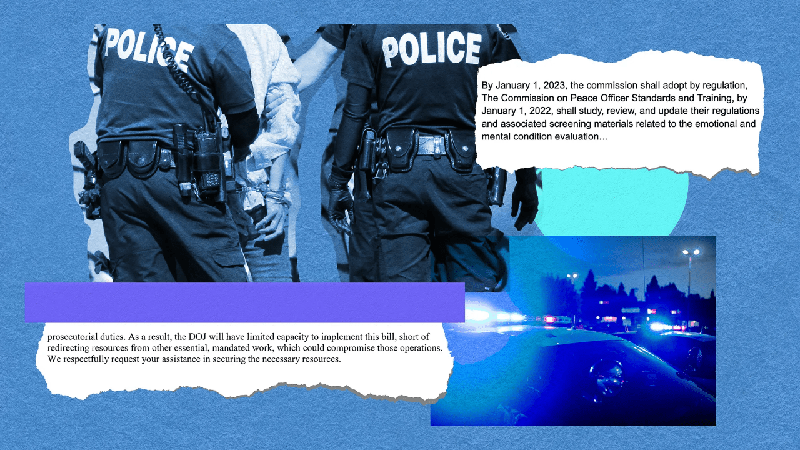

Illustration by Miguel Gutierrez Jr., CalMatters; iStock
By NIGEL DUARA and BYRHONDA LYONS
California Department of Justice agents realized they were short-handed just hours after a Los Angeles police officer shot and killed an unarmed man on Hollywood Boulevard.
A 911 caller told police the man was threatening people on the morning of July 15, 2021, waving what appeared to be a pistol in a busy tourist pocket. The object in his hand turned out to be a lighter with a pistol grip.
The fatal shooting was the first test of a law requiring the Justice Department to investigate police shootings of unarmed civilians. The agents would need to interview witnesses, mark evidence and canvass nearby businesses for surveillance footage, according to documents detailing the state’s response.
The department’s budget for these complex shooting investigation teams allotted three agents; the department sent 12.
Even so, justice officials would later say, it wasn’t enough — calling their deployment “inadequate.”
“There were dozens of tasks and assignments that the … special agents could not accomplish because of limited staffing,” the department wrote in a budget request submitted to the Legislature in January.
For decades, police oversight in California began and ended within a local department. Rarely did the state step in.
That has changed. After unarmed Stephon Clark was shot and killed by Sacramento police officers in 2018, state lawmakers began taking a more active role in police accountability, passing several statewide mandates aimed at improving policing in California. Since then, they’ve tapped both the Department of Justice and California Commission on Peace Officer Standards and Training (POST) for new duties.
But ambitious deadlines, new job responsibilities and delayed funding are testing the limits of both agencies, officials say.
The shooting investigation on Hollywood Boulevard is still open, as are all 20 other Justice Department investigations into the shooting of unarmed civilians.
California’s Commission on Peace Officer Standards and Training missed its deadline this year to get police departments up to speed on newly-required bias screening for police applicants. The commission has also been given new authority to decertify police officers, a responsibility that is reshaping the previously low-profile commission.
Both agencies were redirected by legislation. For the Justice Department, its new role came with Assembly Bill 1506, which mandates that its agents investigate each officer-involved shooting of an unarmed civilian. Beginning next year, upon request of a law enforcement agency, the state is also supposed to begin reviewing the local agency’s use of force policy and make recommendations.
Read “New Police Accountability Laws Up Demands On State Agencies” on CalMatters.
CalMatters.org is a nonprofit, nonpartisan media venture explaining California policies and politics.